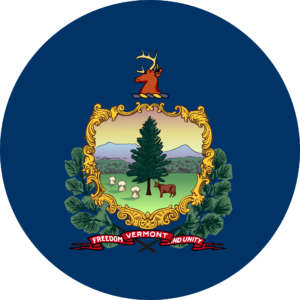Vermont sales tax guide
You are reading 1stopVAT’s Vermont sales tax guide. This article will go through the details of the sales tax in Vermont (VT).
The page has been updated by our tax specialists at 1stopVAT with the most recent and important details on how the Equality State’s sales tax works.
You can learn a lot about sales tax and how it affects both consumers and companies, such as who is responsible for paying state sales tax and where you can get more information.
Whether you’re pondering what is the sales tax rate in Vermont, whether you need to register for Vermont tax sales, or the filing frequency of Vermont state sales tax, our sales tax guide can assist you.
Please contact the 1stopVAT team if you have any more questions or require assistance.
A Digest on Vermont sales tax (VT)
A sales tax is a tax levied by a taxing authorities (either state or local) on the sale of certain goods and services. Vermont enacted a general state sales tax in 1969, and the sales tax rate in Vermont has since climbed to 6%.
In addition to the Vermont sales tax rate, one or more local sales taxes, as well as one or more special district taxes ranging from 0% to 1%, may be applied.
The total sales tax rate in Vermont ranges from 6% to 7%, depending on the sale area.
Vermont Tax Nexus
The requirement to collect Vermont sales tax is reliant on maintaining a strong connection with the state This is known as nexus, and it establishes whether the state has the legal authority to compel your firm to collect, pay, and remit sales tax.
Remote or out-of-state merchants who have no physical presence in Vermont can establish sales tax nexus in the following ways:
One attribute of affiliate nexus is having someone solicit product sales on behalf of the Vermont merchant.
Economic nexus is established and a remote seller is obliged to register with the state, collect, and pay sales tax in Vermont if they sell more than $100,000 worth of taxable or exempt products or services there, or if they conduct 200 or more distinct sales transactions there during the previous year.
Products owned by Fulfillment by Amazon (FBA) merchants and stored in Vermont warehouses are included in the State’s inventory.
A trade show nexus is created by companies that attend trade fairs and have sales targets. However, if you merely go to trade exhibitions, there is no nexus created.
Vermont sales tax online registration
To register for a Vermont seller’s permit online, you must submit specific information regarding your business through the Vermont Department of Taxes.
Information about your company, yourself, and your projected sales must be sent to the Department of Taxes.
In Vermont, there is no cost to register for a sales and use tax license.
If you want assistance with registration or anything else associated with the sales tax rate Vermont, kindly get in touch with the 1stopVAT team.
Vermont Taxable Items and Services
Prior to calculating how much is the sales tax in Vermont, it is necessary to identify which items and services are subject to the tax or are exempt.
The majority of non-prepared foods, transactions made with food stamps, and prescription drugs are all exempt from sales tax Vermont, under state law.
Additionally, according to State Law; healthcare, manufacturers, and software are exempt from the Vermont state sales tax rate.
Tangible personal property utilized in commercial operations such as tools, furniture, fixtures, and other equipment is regarded as tangible personal property.
On tangible personal property, businesses in Vermont are required to pay the Vermont sales tax rates.
What is the current sales tax in Vermont?
According to the Vermont Department of Taxes, the total Vermont sales tax percentage is 6%.
In addition, there are one or more local sales taxes and one or more special district taxes ranging from 0% to 1%, putting the total Vermont sales tax percentage at 6% to 7%
You may use our sales tax calculator or get in touch with the 1stopVAT team to quickly determine how much sales tax in Vermont your business needs to collect.
Vermont Tax Frequency
Once you have registered with the Vermont Department of Taxes and started collecting sales tax rates Vermont, you are responsible for transferring tax proceeds from customers to tax authorities.
The Department of Taxes will assign a filing schedule to your company.
You will be offered a monthly, quarterly, or annual frequency. The quantity of sales your organization makes determines the frequency.
For instance, bigger, more well-known businesses must file more regularly.
There are filing requirements for the sales and use tax Vermont.
Did you gain all the information you required about the Vermont sales tax?
We hope we were able to answer all of your inquiries, like what’s the sales tax in Vermont, by giving you the information you required.
Need assistance with Vermont sales tax?
We can help!
Dedicated account manager
As our client, you will be assigned to a multilingual account manager who can address all your tax-related inquiries and resolve any issues you may have at any time.
Single point of contact
We serve as single point of contact, simplifying the process and ensuring that your VAT compliance is handled efficiently and effectively within single stop.
Exclusive customer service
We support our clients, ensure fast response time and always go beyond by offering tailored assistance and individual attention.
Certified experts
Our team is combined of more than 40 experts, who can provide wide range of services and are certified members of IVA, AITC and VAT Forum. Currently we have more than 800 clients and knowledge how VAT works in 100 locations.



